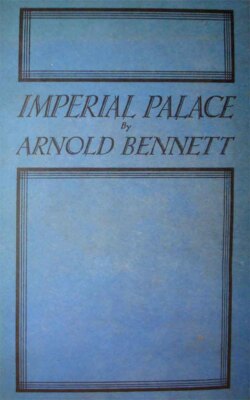Читать книгу Imperial Palace - Arnold Bennett - Страница 39
На сайте Литреса книга снята с продажи.
Chapter XVIII – THE VACANT SITUATION
ОглавлениеI
Just before noon, on the morning of Gracie’s most unexpected departure, Evelyn was entering the Palace after a business interview in Whitehall. He felt tired, but he had slept, and none but a close student of eyes and of the facial muscles which surround them would have guessed that he was tired. Evelyn could successfully ignore fatigue. Indeed he now took pride in the fact that after two very short nights and one very long and emotionally exhausting day, and with a critical day still in front of him, he had deliberately intensified the critical quality of the latter by adding to his anxieties the inception of a new and delicate task: which task concerned the future of Miss Violet Powler.
As for Gracie, he had learnt that she had left for the Continent by the 9 a.m. train—not the more fashionable 11 a.m. train—with the whole of her luggage and a maid whose arm was in a sling. Sir Henry had not seen her off, and was remaining in the hotel. Evelyn surmised that the impulsive girl had chosen the earlier train because in the circumstances it was just as easy for her as the other, if not easier. Doubtless she had said to herself: “I’m up late. I’ll stay up, and catch the first train. That will give me two hours less in his ghastly hotel, and two hours more in Paris.” For Paris was certainly her destination. Where else should she go? He surmised further that, if her maid was disabled, Gracie had done her own packing, and the maid’s too. He was sure that she was ‘that sort.’ Also she was the sort that could take pride in ignoring fatigue. A point of resemblance between them! He liked to think of the resemblance. Of course her departure was the result of pique. Well, let it be! He found a sardonic pleasure in her pique. Do her good! His emotions about her were evaporating with extreme rapidity in the fresh air and the commonsense of morning. He needed nobody to tell him, for he could tell himself, that no young woman, however enchanting, could make a lasting impression upon the susceptibilities of a wise man old enough to be her father in an acquaintanceship of sixteen or seventeen hours. She had been calmly but firmly ejected from his mind. Nothing of the astounding episode stayed in his mind except inevitable masculine self-satisfaction at a sentimental conquest, and shame for the absurd feelings which had disturbed his soul after her resentful outburst until he finally settled for the night. One might call him a fish, not a warm-blooded man; but such now was his mental condition, pleasing or the reverse.
Passing through the ever-spinning doors into the great hall he gave a benevolent nod to Mowlem, the day hall-porter, who rendered back the salute with equal benevolence and more grandeur.
Mowlem was one of about a dozen members of the staff each of whom considered himself the most important member of the staff—after Evelyn. He was quite as tall as Sam, and broader, but he pretended to no physical prowess. On the very rare occasions when law and order seemed to be in danger in the great hall he had methods subtler than Long Sam’s of meeting the situation. American citizens nearly always became his friends. Once, an ex-President of the United States, suffering from the English climate and insomnia, had caused Mowlem to be roused from bed, and the two coevals had spent a large part of a night in intimate converse. Mowlem was understood to be writing, with expert assistance, a book of reminiscences of the Imperial Palace entrance-hall, for a comfortable sum of money.
While crossing the hall, Evelyn heard his own name spoken in a discreet feminine voice behind him.
“Can you give me one minute?” asked Mrs. O’Riordan, who also had been out on an errand.
The head-housekeeper in her street attire looked as smart and as spry as any visitor, and she was modestly but confidently conscious of this momentous fact.
“Two,” said Evelyn, having glanced at the clock.
He moved towards a corner at the end of the Reception-counter, and the Irish ‘mother’ of the Palace followed him.
“I think I’ve found someone to take Miss Brury’s place,” said Mrs. O’Riordan, confidentially murmuring. “She’s young, but she’s had experience, and—she’s a gentlewoman.”
“That’s good,” said Evelyn, cautiously, recalling the head-housekeeper’s theory about the advantage of engaging gentlewomen as floor-housekeepers.
He divined at once that Mrs. O’Riordan was specially anxious to be persuasive. Her grey hair never prevented her from exercising a varied charm, of which charm she was very well aware. As she stood before him, he could plainly see in her, not the widow aged sixty-two, but a vivacious maiden of twenty-five or so. The maiden peeped out of Mrs. O’Riordan’s bright eyes, was heard in her lively though subdued voice, and apparent in the slight quick gestures of her gloved hands. At her best, and when she chose, Mrs. O’Riordan had no age. The accent which she had put on the word ‘think’ was a diplomatic trick, to hide the fact that she had decided positively on the successor to Miss Brury. And the successor was no doubt a protégée of the head-housekeeper’s, a favoured aspirant. Assuredly Mrs. O’Riordan had not discovered the exactly right girl by chance in the last twenty-four hours. He foresaw complications, a new situation to be handled; the tentacles of his brain stretched out to seize the situation.
